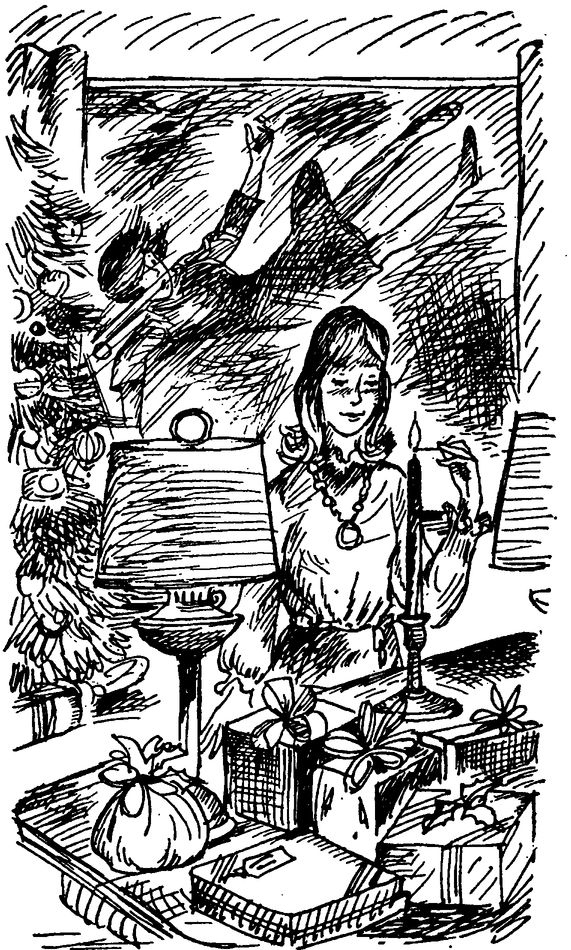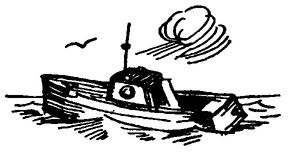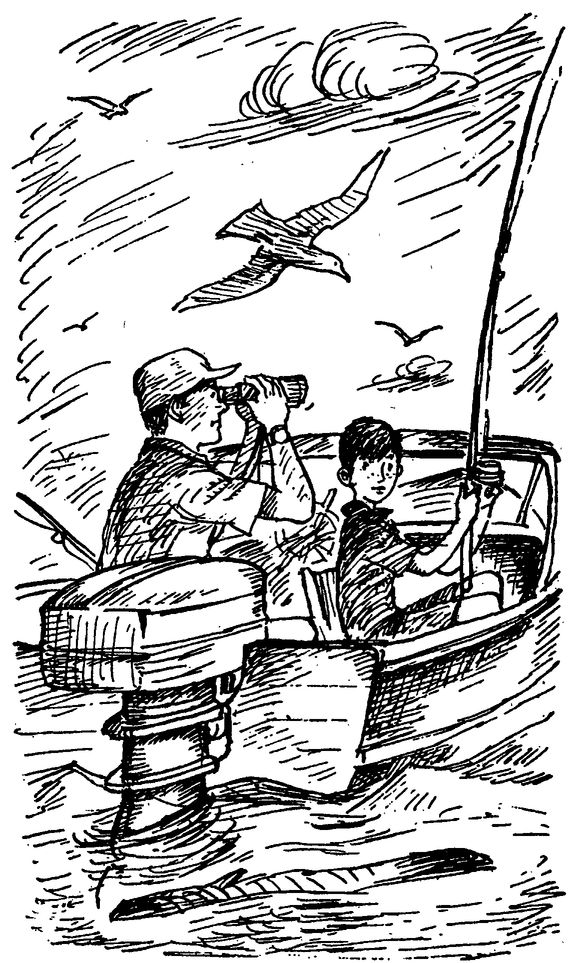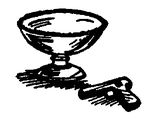Encyclopedia Brown Keeps the Peace (6 page)
Read Encyclopedia Brown Keeps the Peace Online
Authors: Donald J. Sobol

“I wasn’t snooping,” said Scott as he entered the house. “I saw you two sitting on the sofa. I thought you’d make a nice picture. I was going to call it ‘Sitting at Sally’s.’ ”
“You mean
lying
at Sally’s!” snapped Sally. “What were you really doing in the back yard with a camera?”
lying
at Sally’s!” snapped Sally. “What were you really doing in the back yard with a camera?”
“I was looking for things to photograph,” said Scott. “Wednesday is the Junior Photography Show. First prize is a three-speed bicycle.”
“Gosh, I forgot about the show. I’m sorry for what I said,” Sally apologized. “I hope you win the bicycle.” .
“The best I can do is the lady’s folding umbrella,” said Scott. “That’s second prize. Winthrop Ledbetter will win the bicycle.”
“Winthrop always wins,” grumbled Sally.
“By hook or by crook,” added Scott.
“Every kid in the neighborhood knows how Winthrop won the boys’ championships at tennis, golf, and riflery last year,” said Sally. “He cheated.”
“I’m sorry I didn’t report him,” said Encyclopedia, remembering. Whenever Winthrop had fallen behind in a match, a friend had come to the rescue. The friend had screamed bird calls from hiding just as Winthrop’s opponent was serving, putting, or shooting.
“It was cuckoos at the courts, goshawks at the greens, and road runners at the range,” recalled Encyclopedia. “The friend had style.”
“Winthrop will try anything to win,” said Scott. “I want to hire you on Wednesday to be ... well, to be a kind of watchdog.”
“Bird dog, you mean,” said Encyclopedia, and agreed to take the case.
On Wednesday, Encyclopedia and Sally biked to the American Legion Hall. The walls were hung with photographs taken by the young cameramen of Idaville.
Scott Curtis had four pictures in the show. Encyclopedia was thinking that Scott would be hard to beat when Sally tugged at his sleeve.
“Winthrop has only one picture,” she said. “But wait till you see it!”
Encyclopedia blinked as he gazed upon Winthrop’s photograph.
It showed a teenage girl touching a flaming match to a Christmas candle. Beside the candle stood a pile of gifts which was lighted by two table lamps.
What made the picture amazing, however, was the second figure. It was a woman. She could be seen falling outside the large window behind the teenage girl.
The picture was titled “Christmas Miracle.” Beside it was pinned a white card on which was written:
This photograph was taken December 16, at 9:30 P.M., by Winthrop Ledbetter, age 11, in the living room of his parents’ apartment. At the moment Winthrop snapped the picture of his teenage sister Mary, Miss Abigail Greer was toppling from the apartment house roof one story above. Miss Greer’s falling body made this startling background for a photograph that was meant to be used as the Ledbetter family’s Christmas card.
Miss Greer later said she had lost her footing in the storm winds that reached 40 miles an hour. By a miracle, she landed on an awning and suffered only a broken leg.
The picture was taken with a Crown camera and flashgun.

She could be seen falling outside the large window behind the teenage girl.
Encyclopedia said slowly, “There’s something wrong in that picture....”
“Find out what it is, but hurry!” said Sally. “Here come the judges.”
Three men were marching toward Winthrop’s photograph. One of the men carried a blue ribbon.
“They’re going to give Winthrop first prize —and the bicycle!” said Sally. “Encyclopedia, you’ve got to tell them the picture is nothing but a fake! It is ... isn’t it?”
Encyclopedia didn’t seem to be listening. He was gazing intently at the picture.
Suddenly he smiled.
“It’s a fake, all right,” he said. “Winthrop couldn’t have snapped that picture without a real miracle!”
HOW DID ENCYCLOPEDIA KNOW?
(Turn to page 95 for the solution to The Case of the Falling Woman.)

The Case of the Red Boat
“All set for the fish, son?” asked Chief Brown.
Encyclopedia lifted his fishing pole. “All set,” he answered smiling.
He didn’t really feel like smiling. He felt like asking questions. He had seen his father slip a gun into the lunchbox.
During the drive to the docks, Encyclopedia finally got up courage to ask, “Are we really going fishing, Dad?”
“Of course,” replied Chief Brown. “Why do you ask?”
“You brought a gun,” said Encyclopedia.
“Oh ...” said Chief Brown. “You saw it? Well, I don’t expect we’ll meet trouble. I brought it along just in case.”
“In case of what?”
“Do you remember the robbery four days ago down in the islands?” Chief Brown said.
“Two armed men robbed one of the millionaire’s homes,” said Encyclopedia. “They got away with three hundred thousand dollars worth of jewels and furs.”
“The robbers escaped by motorboat,” said Chief Brown.
“That was four days ago. You don’t think they’re still at sea! ” exclaimed Encyclopedia.
“It’s possible,” said Chief Brown. “About the time the robbers made their escape, a storm broke. The rains lasted only an hour or so. But there have been high winds until today.”
“Do you believe the winds blew the robbers’ boat out to sea?” asked Encyclopedia.
“The robbers could still be at sea, out of gas and drifting,” said Chief Brown. “But let’s forget about them. Let’s think about fish.”
At the docks, Encyclopedia helped his father unload the car. They bought ice and bait at the little store by the gas pumps. When everything was aboard, Chief Brown started the motor.
“Cast off,” he called.
Encyclopedia undid the lines. The boat was a twenty footer with an outboard motor. Chief Brown rented her three or four Sundays each summer.
“We’ll try our luck in the ocean first,” said Chief Brown. “If nothing is biting, we can come closer to shore and try for snapper and flounder.”
The boat moved smoothly across the calm waters of the bay. Once in the ocean, Chief Brown speeded up. As the shore fell farther and farther behind, Encyclopedia thought of the robbers.
What if he and his father met them at sea?
The robbers were armed. Would they try to come aboard like pirates? Or would they throw the stolen jewels and furs into the ocean and say they were harmless boatmen?

For several minutes Chief Brown looked through field glasses at a small red boat in the distance.
According to the newspaper stories, the two robbers had worn masks. No one knew what they looked like. As it had been dark, no one could be sure of what their boat looked like-only that it was not white.
Chief Brown slowed the motor. He handed Encyclopedia a fishing rod. “Time to try our luck,” he said.
The fish were biting. Father and son had landed ten beauties when Chief Brown suddenly put aside his rod. For several minutes he looked through field glasses at a small red boat in the distance.
Then he called the Coast Guard on the ship-to-shore radio.
Within forty minutes a Coast Guard cutter came alongside. It carried a big gun on the front deck.
Chief Brown greeted the captain. “I think that’s the one we’ve been looking for,” he said, pointing to the red boat. “I would have moved closer, but my son is with me.”
“Better drop anchor and come aboard,” said the captain. “This will be the safest place if there is shooting.”
Chief Brown put over the anchor. He and Encyclopedia climbed aboard the cutter. The captain shouted orders. The cutter headed for the small red boat.
At first the red boat seemed empty. Then Encyclopedia saw a man. He came out of the tiny cabin and waved.
The cutter swung alongside. A rope ladder was dropped, and the man reached for it weakly. Three Coast Guardsmen helped him aboard.
“Thank goodness you saw us!” the man gasped, stepping onto the deck of the cutter. He took off his cap. With a handkerchief he wiped the heavy sweat from his bald head and face. “Water, please,” he said. “Water!” .
Water was brought. The man drank it in great gulps.
“I’m Rodney Ascot,” he said at last. “Ben Page and I were out for a day’s fishing when the storm hit us. The waves were terrible. The radio went dead right away. Sea water got into the gas, and the engine quit.”
Again he dried the sweat from his head and face with his handkerchief.
“We’ve been drifting four days without food and water,” he went on. “We had some food in a chest, but it was washed overboard with our fishing things. Ben passed out yesterday from thirst. He’s in the cabin.”
Ben Page was immediately brought onto the cutter and taken below. Roger Ascot followed him.
Chief Brown climbed down the rope ladder. For a few minutes he looked carefully around the red boat.
“There’s water in the gas, all right,” he said. “The radio doesn’t work, and I don’t see any food or drinking water.”
“How about guns?” said Encyclopedia. “And the stolen jewels and furs?”
“The boat is clean,” said Chief Brown. “I may have made a mistake. Roger Ascot and Ben Page don’t appear to be the robbers.”
“Don’t believe Roger Ascot’s story,” warned Encyclopedia. “He has the face of a liar!”
WHAT DID ENCYCLOPEDIA MEAN?
(Turn to page 96 for the solution to The Case of the Red Boat.)

Solution to The Case of the Silver fruit Bowl
Chief Brown’s words pointed out to Encyclopedia where Mr. Holt had lied.
Chief Brown said that the silver fruit bowl “was rounded inside like a big spoon.”
It would have been impossible for Mr. Holt, looking into the fruit bowl, to get a good idea of what the holdup man looked like, as he claimed.
Look into a shiny spoon. What do you see? You see yourself as in a mirror,
but-upside down!
but-upside down!
Shown how impossible his story was, Mr. Holt told the truth. He had made up the holdup man. He had stolen the silver dishes himself, hoping to sell them in another city and keep all the money.
Other books
Gone Bad by J. B. Turner
Remember this Titan by Steve Sullivan
Wind Warrior (Historical Romance) by Constance O'Banyon
Grave Attraction by Lori Sjoberg
Beneath the Ice by Patrick Woodhead
The Wrong Woman by Stewart, Charles D
Blink & Caution by Tim Wynne-Jones
New Blood by Gail Dayton
